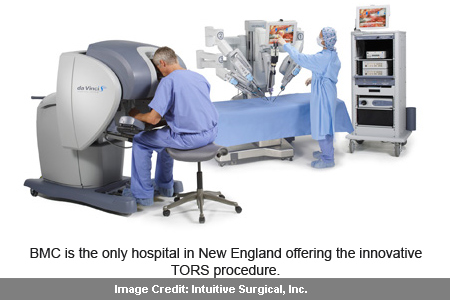Patients diagnosed with head and neck cancer may be subjected to invasive, open surgery. Here is a technology that apparently looks at freeing these patients from the large incisions and long recovery times seemingly linked with such surgeries. Scientists from the Boston Medical Center have supposedly introduced a new minimally-invasive procedure for treating benign and malignant tumors of the throat, larynx and neck.
The robotic procedure termed as transoral robotic surgery (TORS) possible enables scientists to approach and treat tumors through the patient’s mouth. Physicians may often recommend a combination of surgery, radiation therapy and chemotherapy for treating head and neck tumors and most cases are reported successful. But in conventional open surgery an almost ear-to-ear incision across the neck and splitting the jaw is probably a necessity. Patients undergoing this form of surgery can possibly face significant speech and swallowing deficiency.
Gregory Grillone, M.D., F.A.C.S. BMC otolaryngologist and surgeon, commented, “We are able to enter through the mouth and use the robotic tools as extensions of our hands. Compared to traditional surgery, I have found patients treated via the robot require less anesthesia and experience less complications, shorter hospital stays and faster recovery periods. In addition, this method allows us to better preserve speech, swallowing and other key quality of life issues.â€
Even a complicated surgery can be possibly conducted in minimal time by the employment of the newly developed robot and with less recovery time for the patient. The robot apparently has various instruments attached to it. This facility can seemingly allow the instruments to move freely in all directions, just like the movements of human wrist. Surgeons may also be provided with a 3D image by the robot, so they can estimate depth of field while operating. It is claimed that BMC is the only hospital in New England that offers the innovative technique.

